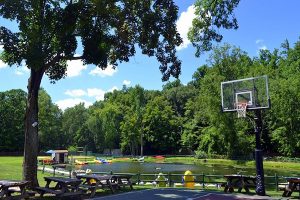|
RCBJ-Audible (Listen For Free)
|
Two Residential Projects in Rockland County Take Critical Steps Forward Toward Approval
New York Country Club Site
 The redevelopment of the land at the New York Country Club, a parcel of almost 150 acres at 103 Brick Church Road in New Hempstead into a residential subdivision advanced as the Village of New Hempstead Board of Trustees determined that the proposal to allow single-family homes on lots of only 10,000 square feet would likley have a significant adverse impact on the environment. The positive declaration under New York’s State Environmental Quality Review Act (SEQRA) requires the developer to prepare a Draft Environmental Impact Statement.
The redevelopment of the land at the New York Country Club, a parcel of almost 150 acres at 103 Brick Church Road in New Hempstead into a residential subdivision advanced as the Village of New Hempstead Board of Trustees determined that the proposal to allow single-family homes on lots of only 10,000 square feet would likley have a significant adverse impact on the environment. The positive declaration under New York’s State Environmental Quality Review Act (SEQRA) requires the developer to prepare a Draft Environmental Impact Statement.
The petition before the Village calls for an amendment to the Village’s Zoning Code seeks to map a new zoning district, 1R-10, over the New York Country Club property.
A proposal submitted to the Village of New Hempstead originally asked to have the golf course re-zoned to R-10 which would allow for 344 single family homes on the property.
The golf course’s previous owner proposed a development plan with the Village that included a mix of housing types under the Village’s optimized cluster development program, but that plan never advanced.
The golf course property sold in 2023 for $35 million. The 18-hole, par 72 course was built in 1996. The property featured a refurbished clubhouse, wedding venue, pro shop, bar & grill, and other amenities.
A public meeting on the Draft Scope will be held on May 28, 2025 at 7:00 p.m. at 108 Old Schoolhouse Road New City, NY 10956.
Blue Rill Day Camp Property
 The Village of Airmont has accepted a Final Environmental Impact Statement on the proposed Blue Rill Senior Estates development. The plan calls for the construction of a 105-unit senior housing development at the former Blue Rill Day Camp on Saddle River Road, just south of Long Meadow Drive.
The Village of Airmont has accepted a Final Environmental Impact Statement on the proposed Blue Rill Senior Estates development. The plan calls for the construction of a 105-unit senior housing development at the former Blue Rill Day Camp on Saddle River Road, just south of Long Meadow Drive.
The plan contemplates changing the zoning to include an overlay on the 18 acres property. Each senior unit would be about 2,000 square feet. The project is located at 444 Saddle River Road in the Village of Airmont.
Blue Rill Day Camp, situated on the banks of the Saddle River in Airmont, boasted three heated pools, a fishing/boating pond, a full adventure course with a rock wall and zip lines, a go kart track, an archery range, a theatre, a ceramics studio, two cooking rooms, and multiple tennis/basketball courts, baseball/soccer fields, and other facilities. It last served campers in 2019.
In 2021, Blue Rill Estates, LLC purchased the former day camp site for $8 million. A fire last year at the day camp caused some damage to the existing structures.
The site sits adjacent to the Town of Ramapo Saddle River pool, which closed in 2023, and is being considered for redevelopment into a park, miniature golf course, or some other recreational use.
The 18-acre day camp site sits partly in Airmont’s R-35 and RR-50 zoning districts, and is in a 100-year flood zone. Airmont, in response to a shortage of housing for seniors, amended its Village code and created the RSH (Specialized Housing Residential) district. The district is essentially a floating zone that allows senior housing by Special Permit from the Village Board of Trustees.
Based on the criteria established in the Airmont code – frontage on Saddle River Road, having more than four acres, and proximity to an NS (Neighborhood Shopping) zone — the Blue Rill site is eligible for a special permit. Several variances will also be required for the project, including side setbacks, side yards, building coverage, and distance between detached buildings.
New York Court Of Appeals Hears Challenge To Adequacy Of Vacancy Studies In Rent Stabilization Implementation
Rent stabilization efforts by local communities is not dead yet, and a decision by New York’s highest court will either breathe new life into local efforts to protect tenants or put the kibosh on rent stabilization efforts in upstate communities.
New York’s Court of Appeals recently heard an appeal by Hudson Valley Property Owners Association and a handful of Kingston landlords challenging Kingston’s efforts to implement the Emergency Tenant Protection Act (ETPA) which allows municipal governments to declare a rent emergency and impose restrictions on a class of buildings constructed before 1974.
Kingston’s efforts were greenlit by two lower courts that approved its vacancy study, despite objections from landlords that the study was flawed. Competing studies conducted by property owners showed vacancies above the 5% threshold to declare a housing emergency.
Efforts to implement the ETPA have been stymied in Poughkeepsie, Newburgh and in Nyack as landlords challenge and undermine the methodologies and undertakings of local governments in conducting vacancy surveys.
The Court of Appeals seemed receptive to arguments that studies need not be perfect and that good faith efforts to measure vacancies could pass legal muster, even if flawed. A decision is not expected for months, but legislation is pending that would make vacancy studies optional and expand opportunities for municipalities to opt into the ETPA. A finding for the landlord group would create a pathway for landlords to challenge vacancy studies by conducting their own competing studies or finding flaws in municipal results.
A decision by the Court of Appeal regarding vacancy study methodologies would apply statewide.
Legislation passed in 2023 imposed penalties on landlords that refused to participate in studies, and allowed local governments to assume non-participating landlords has zero vacancies.
Opponents to the ETPA argue that rent stabilization creates a disincentive for investment in housing, precludes updating of older buildings most in need of maintenance and repair, deprives landlords of a return on their investments, and unfairly requires a small class of landlords to solve the larger societal problem of an inadequate number of housing units.
Opponents also argue that imposition of rent stabilization on a property devalues its resale value and limits a building owner’s ability to finance and/or refinance a property.
Lynmark’s Crowne Plaza Suffern Modernizes Rooms, Public Spaces, and Event Spaces
The Crowne Plaza Suffern-Mahwah, a fixture in the community under family ownership for the last 25 years, has completed a multimillion-dollar capital improvement project designed to modernize and enhance guest experiences.
 The extensive renovations include refreshing 229 guest rooms with modern amenities such as mini-fridges, Keurig coffee makers, 55-inch flat-screen TVs, upgraded bedding, and high-speed wireless internet.
The extensive renovations include refreshing 229 guest rooms with modern amenities such as mini-fridges, Keurig coffee makers, 55-inch flat-screen TVs, upgraded bedding, and high-speed wireless internet.
Public spaces, including the hotel’s open-concept atrium and 25,000 square feet of meeting and event space were redesigned and can accommodate gatherings of up to 600 guests.
And, the Montebello Ballroom, a venue for celebrations and corporate events, was fully reimagined in collaboration with Karen Dallago of Dallago Associates with a modern aesthetic.
The property is part of the Suffern-based Lynmark Group, a development group with properties in New York, Alabama, Illinois and the British West Indies. Lynmark is also affiliated with the MMS Group (a real estate management firm), Goldoller Real Estate Investment (a real estate investment firm) and Selene Energy (a solar energy contractor servicing Lynmark properties).
“Over the past two decades, we’ve seen the hospitality landscape in this region change dramatically,” said Joshua Goldstein, developer and owner of Crowne Plaza Suffern-Mahwah and principal at Lynmark Group. “For our family and our team at Lynmark, this renovation was about more than staying competitive. It was about strengthening our commitment to the community, continuing to lead regional hospitality, and building on our legacy, which also includes nearby projects like The Sheldon at Suffern Station.”
The Sheldon is a $35 million development comprised of 92 residential market-rate rental units in the downtown area of the Village of Suffern.
Lynmark also owns Executive Plaza, a two office building complex adjacent to the Crowne Plaza with over 140,000 square feet of Class A office space.
Lynmark has a long history of building in Rockland County, with projects including Wedgewood Estates (72 Single Family Homes) in New City, Grandview Acres (60 Single Family Homes) in Nanuet, Bon Aire Park (1,400 Garden Apartments) in Suffern, Jardin Hills and Highland Knolls (310 Single Family Homes) in Monsey, and many other developments in Monsey, Clarkstown, Spring Valley, Suffern, Pearl River, Haverstraw and Piermont.














